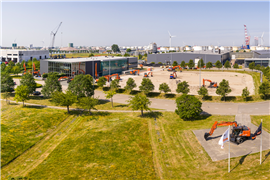AI could reduce annual carbon footprint of the built world by 50% by 2030
13 March 2024
Global proptech venture capital firm Pi Labs has launched ‘Sustainably Intelligent: AI for a Greener Built World’, a research report that uncovers new details about the impact artificial intelligence will have on reducing carbon impact in the built environment.

The report found that 5.81 to 6.46 gigatonnes CO2-e of greenhouse gas (GHG) emissions can be avoided annually by 2030 with industry-wide adoption of just four AI use cases. Pi Labs says that this would offset the entire annual carbon footprint of the United States—the world’s second largest GHG emitter – according to 2022 figures.
After examining 68 sustainability-oriented use cases for AI across the value chain, the following were selected to conduct the analysis with the use of proprietary and public data; reducing raw material inputs through generative design, preventing construction rework with 3D AI analytics, reducing building energy intensity with AI-enabled smart building technology, and redirecting demolition waste with AI-enabled waste material analysis.
Luke Graham, Head of Research of Pi Labs, said, “With the built world already falling behind on climate targets, we are pleased to share that the findings of our report indicate that AI is set to have a transformative impact on carbon reductions.
“According to venture funding data from 2023, there is already significant investor interest in AI driven green solutions aimed at the built environment, however there is the potential to drive this figure up yet further with a clearer understanding of the positive climate impact and growth potential of these technologies. The good news is that the pace of AI innovation being achieved since the launch of ChatGPT in late-2022 can be put towards significant climate change mitigation by 2030 and as always, the early adopters within the real estate world are set to benefit the most.”
CONNECT WITH THE TEAM









